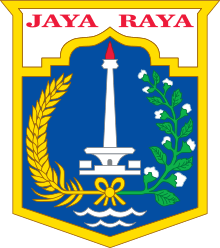Suwiryo
Raden Suwiryo (17 February 1903 – 27 August 1967) was an Indonesian politician who was the first Mayor of Jakarta after Indonesian independence, and was Deputy Prime Minister of Indonesia under the Soekiman government between 1951 and 1952.
Suwiryo | |
|---|---|
.jpg) | |
| Deputy Prime Minister of Indonesia | |
| In office 2 May 1951 – 1 April 1952 | |
| Prime Minister | Soekiman Wirjosandjojo |
| Preceded by | Hamengkubuwono IX |
| Succeeded by | Prawoto Mangkusasmito |
| Mayor of Jakarta | |
| In office 30 March 1950 – 2 May 1951 | |
| Preceded by | Hilman Djajadiningrat (as Governor of Batavia) Sastromoeljono (as Mayor of Batavia) |
| Succeeded by | Syamsurizal |
| In office 23 September 1945 – November 1947 | |
| Preceded by | Hasegawa Shigeo |
| Succeeded by | Elbert Marinus Stok |
| Personal details | |
| Born | 17 February 1903 Wonogiri, Surakarta, Dutch East Indies |
| Died | 27 August 1967 (aged 64) Bandung, Indonesia |
| Resting place | Kalibata Heroes Cemetery |
Early life and career
Suwiryo was born in Wonogiri, then part of the Surakarta Sunanate, on 17 February 1903. After completing his education, he worked at the central statistical body, became a teacher, worked at an insurance company, and founded a pharmaceutical business. He became a participant in the Indonesian National Party, and upon its dissolution in 1931, was one of the co-founders of the succeeding Indonesia Party.[1]
Politics
Independence of Indonesia
During the Japanese occupation of Indonesia, Suwiryo worked as head of economic affairs at the headquarters of mobilization center Putera and later worked at Jawa Hokokai.[2] In 1945, he became a deputy mayor of Jakarta under Japanese mayor Hasegawa Shigeo. Following the surrender of Japan, a group of Indonesian officials approached Hasegawa and requested him hand over power peacefully to Suwiryo on 7 September 1945. Though he refused the demand, Hasegawa stopped attending office, resulting in Suwiryo being de facto mayor.[3]
Suwiryo was elected by municipal employees of Jakarta's government as the new mayor on 23 September 1945.[3] During the early parts of the Indonesian National Revolution, Suwiryo continued to lead the city administration of Jakarta despite the military occupation of the allied forces. He also joined a committee which was meant to establish cooperation between the Indonesian police forces and the British military.[4] During this period, there was competition between the authorities established by the Dutch East Indies government and the Republican government, though in general the former focused on European affairs and the latter focused on the Indonesian inhabitants.[5]
Suwiryo was arrested by the Dutch forces alongside some other Republican administrators on 20 July 1947, shortly before Operation Product.[6] After being arrested for several months, Suwiryo was flown to Yogyakarta - the Republic of Indonesia's new capital - in November 1947 and he became head of demographic affairs of the government, with Daan Jahja becoming the military governor of Jakarta.[1][7]
Second term
Following his reappointment as mayor by Sukarno on 17 February 1950 during the United States of Indonesia period,[1] Suwiryo began developing Jakarta as a metropolitan city, through development of new areas and issuance of some regulations. On 1951, he was appointed as Deputy Prime Minister and left the office, which was briefly vacant until Suwiryo was succeeded by Syamsurizal.[8]
Post-politics
After his time as deputy prime minister, Suwiryo worked at the Ministry of Internal Affairs for some time, and became head of several state-owned banks, in addition to joining the Constitutional Assembly of Indonesia. He died on 27 August 1967, and was buried in Kalibata Heroes Cemetery.[1][2]
References
Footnotes
- Suryana, Dede (28 June 2012). "Raden Suwiryo, Walikota Pertama Jakarta". Okezone (in Indonesian). Retrieved 14 February 2019.
- "Suwirjo - PNI (Partai Nasional Indonesia) - Member Profiles". Konstituante.Net.
- Cribb 1986, p. 130.
- Cribb, Robert (2008). Gangsters and Revolutionaries: The Jakarta People's Militia and the Indonesian Revolution, 1945-1949. Equinox Publishing. pp. 74, 95. ISBN 9789793780719.
- Cribb 1986, p. 133-135.
- Cribb 1986, p. 142.
- Kresna, Mawa (21 September 2016). "Ragam Profil Gubernur DKI, dari Henk Ngantung Hingga Ahok". tirto.id (in Indonesian). Retrieved 14 February 2019.
- Sedyawati, Edi; Rahardjo, Supratnikno; Johan, Irmawati Marwoto; Ohorella, G. A. Manilet- (1986). Sejarah Kota Jakarta 1950-1980 (in Indonesian). Direktorat Jenderal Kebudayaan. p. 139.
Bibliography
- Cribb, Robert (1986). "Administrative competition in the Indonesian revolution: the dual government of Jakarta, 1945-1947". The Indonesian Revolution: papers of the conference held in Utrecht, 17-20 June 1986. Rijksuniversiteit te Utrecht. pp. 129–143.CS1 maint: ref=harv (link)
